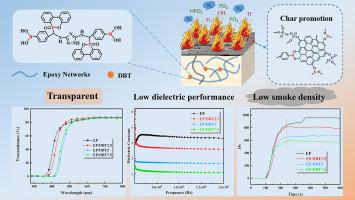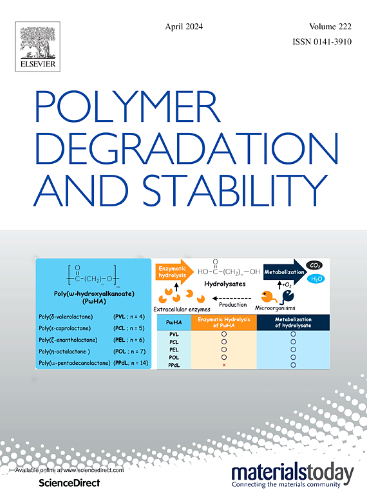使用含 P/N/B 的反应型阻燃剂的阻燃、透明、低介电常数和低烟密度 EP 复合材料
IF 6.3
2区 化学
Q1 POLYMER SCIENCE
引用次数: 0
摘要
为了研究燃烧时烟雾释放密度低的改性阻燃环氧树脂(FREP),以 4-乙酰基苯硼酸、3,5-二氨基三唑和 DOPO 为原料,合成了含有 P/N/B 元素的阻燃剂 DBT。将 DBT 作为辅助固化剂添加到胺固化环氧树脂体系中,根据树脂的 DSC 结果,发现 DBT 结构中的 -NH- 能够促进 EP 固化。引入 DBT 后,FREP 样品的透明度受到轻微影响。由于 FREP 体系中的 DBT 具有优异的阻燃性,在添加 5 wt% DBT 时,FREP 样品在 UL-94 测试中达到了 V-0 级,LOI 为 35.9%。同时,锥形量热仪测试结果表明,与环氧树脂相比,EP/DBT7.5 样品的 PHRR、THR 和 av-EHC 分别降低了 34.0%、35.4% 和 18.68%。DBT 能有效降低 EP 的烟密度,EP/DBT7.5 样品达到了 DS (4) 和 VOF4 的 HL1 水平。残炭的化学分析显示,DBT 主要通过在凝结相中形成含 P/B 的炭来实现阻燃和抑烟。由于 DBT 结构中存在刚性基团,FREP 样品的机械性能没有损失。此外,还注意到 FREP 样品的介电损耗和介电常数随着含量的增加而降低。本文章由计算机程序翻译,如有差异,请以英文原文为准。

Flame retardant, transparent, low dielectric and low smoke density EP composites implemented with reactive flame retardants containing P/N/B
For the purpose of investigating the modified flame-retardant epoxy resin (FREP) with the low smoke density release during combustion, the flame retardant containing P/N/B elements named DBT was synthesized with the raw materials of 4-Acetylphenylboronic acid, 3,5-diaminotriazole and DOPO. The DBT was added as a co-curing agent to an amine-cured epoxy resin system, and based on the DSC results of the resin, it was revealed that -NH- in the structure of the DBT was capable of facilitating EP curing. With the introduction of DBT, the transparency of FREP samples was slightly affected. On account of the excellent flame retardancy exerted by the DBT in the FREP system, the FREP samples reached the V-0 grade in UL-94 testing with an LOI of 35.9% at 5 wt% DBT addition. Meanwhile, the results of the cone calorimetry test demonstrated that in comparison with the epoxy resin, the PHRR, THR and av-EHC of the EP/DBT7.5 sample decreased by 34.0%, 35.4% and 18.68%, respectively. The DBT was effective in reducing the smoke density of EP, and the EP/DBT7.5 sample attained the HL1 level for DS (4) and VOF4. The chemical analyses for residual char revealed that DBT was mainly employed for flame retardancy and smoke suppression by forming P/B-containing chars in the condensed phase. There was no loss of mechanical properties of the FREP samples as the rigid groups were present in the DBT structure. Furthermore, it was noted that the FREP samples exhibited a decrease in dielectric loss and dielectric constant as the content increased.
求助全文
通过发布文献求助,成功后即可免费获取论文全文。
去求助
来源期刊

Polymer Degradation and Stability
化学-高分子科学
CiteScore
10.10
自引率
10.20%
发文量
325
审稿时长
23 days
期刊介绍:
Polymer Degradation and Stability deals with the degradation reactions and their control which are a major preoccupation of practitioners of the many and diverse aspects of modern polymer technology.
Deteriorative reactions occur during processing, when polymers are subjected to heat, oxygen and mechanical stress, and during the useful life of the materials when oxygen and sunlight are the most important degradative agencies. In more specialised applications, degradation may be induced by high energy radiation, ozone, atmospheric pollutants, mechanical stress, biological action, hydrolysis and many other influences. The mechanisms of these reactions and stabilisation processes must be understood if the technology and application of polymers are to continue to advance. The reporting of investigations of this kind is therefore a major function of this journal.
However there are also new developments in polymer technology in which degradation processes find positive applications. For example, photodegradable plastics are now available, the recycling of polymeric products will become increasingly important, degradation and combustion studies are involved in the definition of the fire hazards which are associated with polymeric materials and the microelectronics industry is vitally dependent upon polymer degradation in the manufacture of its circuitry. Polymer properties may also be improved by processes like curing and grafting, the chemistry of which can be closely related to that which causes physical deterioration in other circumstances.
 求助内容:
求助内容: 应助结果提醒方式:
应助结果提醒方式:


